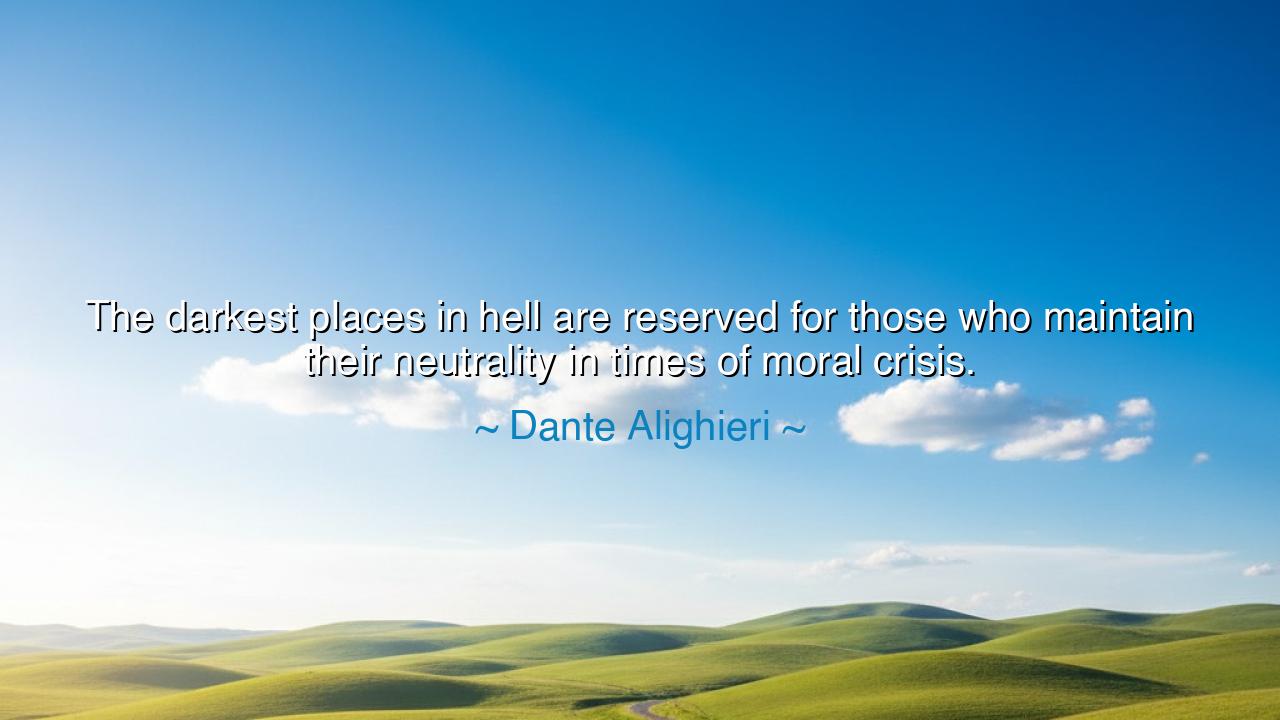
The darkest places in hell are reserved for those who maintain
The darkest places in hell are reserved for those who maintain their neutrality in times of moral crisis.






The words of Dante Alighieri, “The darkest places in hell are reserved for those who maintain their neutrality in times of moral crisis,” thunder like a judgment upon the timid soul. They remind us that silence in the face of evil is not innocence but complicity. To remain neutral when justice cries out is to take the side of the oppressor, to let wickedness triumph by one’s own inaction. Thus, the harshest punishments are not for the openly wicked alone, but for those who, in cowardice, refused to choose.
In the ancient spirit, this truth is eternal. The moral crisis is the crucible where character is tested. To speak, to resist, to act—these are the flames that purify the righteous. But to stand idle is to betray both heaven and earth. Dante, in his Divine Comedy, places the lukewarm souls outside the gates of paradise or damnation, unworthy of either, for they lived without conviction. In this vision, he teaches that the failure to act is as grievous as the act of evil itself.
History bears witness in the age of Nazi Germany. While some resisted at great cost, many remained silent, convincing themselves they were “neutral.” Yet their neutrality allowed tyranny to expand until it engulfed millions of lives. By refusing to act, they became the silent allies of evil. This is Dante’s warning made flesh: that neutrality in the face of horror is a betrayal so deep it earns the darkest place in hell.
Another mirror is found in the story of Martin Luther King Jr., who centuries later echoed Dante’s wisdom: “The hottest place in Hell is reserved for those who remain neutral in times of great moral conflict.” King knew that silence in the face of segregation and injustice was no shield, but a surrender of conscience. His struggle revealed that the greatest obstacle to justice was not the hate of the few, but the apathy of the many.
So let this teaching endure: in every age, the soul will be tested by moments of moral crisis. To remain silent is to abandon the battlefield to cruelty. But to act, even at great risk, is to stand with truth. Dante’s words are not merely warning, but command: do not hide behind neutrality when righteousness calls. For the weight of eternity falls not only on what we do, but also on what we refuse to do when the hour of decision arrives.






NYnguyen yen
Dante’s words seem to imply that inaction is as bad as, or worse than, taking a harmful stance. But can we really apply such black-and-white thinking to complex moral crises? What if neutrality comes from fear, uncertainty, or a lack of resources? It’s easy to say one should always act, but in reality, the choices people make in moments of crisis can be deeply influenced by personal circumstances. Is it always a moral failure to choose inaction?
GDGold D.dragon
I’m struck by the intensity of Dante’s words—’the darkest places in hell’—and it’s hard not to agree that there are times when neutrality feels like a betrayal. But is it fair to judge everyone who is passive in times of crisis? Some might argue that the burden of moral action shouldn’t fall on individuals alone, especially in systems where corruption or power dynamics prevent meaningful change. How do we balance moral duty with the limitations of our own influence?
KKalyy
This quote feels particularly relevant in today’s world, where standing by in the face of injustice is often seen as complicity. But does neutrality always equate to choosing the wrong side? Could there be cases where people remain neutral because they don’t know enough or feel powerless to act? Maybe Dante's perspective oversimplifies the complexity of moral decisions, but it does push us to think about our responsibilities during critical moments.
KKirito
Dante's quote challenges the concept of neutrality, especially in times of moral crisis. It makes me wonder—can neutrality ever be justified in the face of injustice? When should we speak out, and when is it acceptable to remain silent? Is it truly worse to remain neutral, or are there times when doing so can be a form of survival? It’s a provocative thought that pushes us to examine our own moral compass.